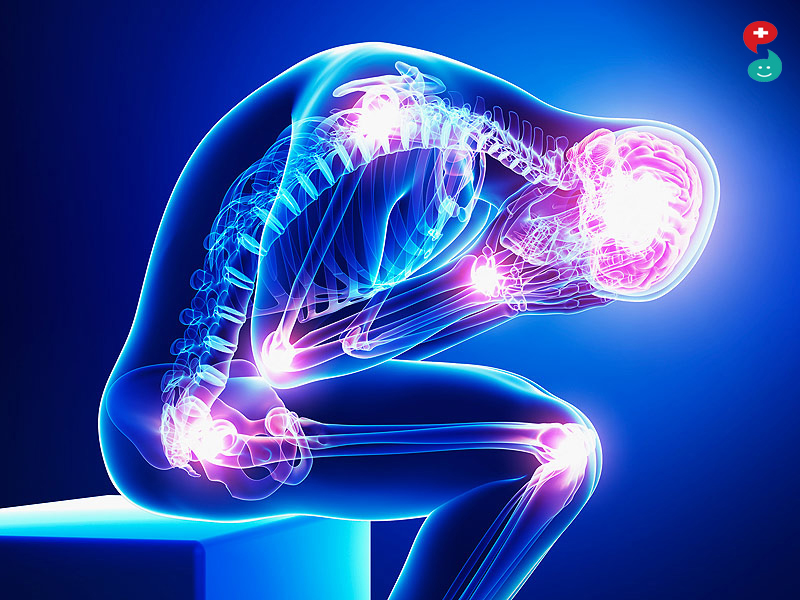
Neuropathic pain, or nerve pain, is one of the most intense types of chronic pain, often
described as sharp, stinging, or burning. It is pain caused by damaged nerves or a problem
with the nervous system. While neuropathic pain can be debilitating, the upside is that there
are medications to treat it, and they work by changing the way the brain interprets pain.
Symptoms
There are many terms used to describe neuropathic pain, such as:
Sharp
Shooting or "electrical shock"
Burning or "hot"
Tingling, "pins and needles," or "prickling"
Stabbing
Neuropathic pain can occur all the time or come in spurts. Likewise, neuropathic pain can
range in intensity from being mild and nagging to severe and disabling.
Interesting, neuropathic pain tends to be worse at night, which may disrupt your sleep. It also
tends to flare at rest, which may affect relaxation or meal time. Overall, the negative impact
neuropathic pain has on one's quality of life can lead to psychological problems, such as
depression and anxiety.
Causes
There are many reasons why a person may develop neuropathic pain. For instance, some
types of neuropathic pain are caused by medications, like certain chemotherapies. Others
may be the result of a disease that affects the nervous system, like Guillain-Barré syndrome,
cancer, multiple sclerosis, multiple myeloma, alcoholism, and HIV.
Neuropathic pain is also common in diseases that attack sensory nerves, such as diabetes,
and in conditions where certain nerves are inflamed or compressed, as in carpal tunnel
syndrome or sciatica. Nerve pain may also result from trauma, like with spinal cord injury,
where nerves are damaged or severed.
Phantom limb pain is another neuropathic pain disorder in which pain feels as if it is coming
from a limb that was amputated.
Unfortunately, some types of neuropathic pain have an unknown origin or a cause that is not
completely understood. Reflex sympathetic dystrophy (CRPS) is an example. Though the
cause may not be fully known, the pain is very real.
Diagnosis
The diagnosis of neuropathic pain requires a detailed medical history and physical
examination, which are often enough to determine the "why" behind a person's neuropathy.
However, sometimes the diagnosis requires an evaluation by a specialist, like a neurologist.
In this instance, the diagnosis may require more testing including blood tests, nerve tests like
an electromyography (EMG), or imaging tests, like magnetic resonance imaging (MRI) of the
brain or spinal cord.
Treatment
Treatment of neuropathic pain first entails addressing the underlying problem. For example, if
a person has neuropathic pain from diabetes, optimizing blood sugar (glucose) control is an
essential next step. Bear in mind, though, enhanced glucose control cannot generally reverse
the neuropathy, although it can prevent it from getting worse and ease current symptoms.
As another example, if a medication is causing debilitating nerve pain, removal or a decrease
in the dose of the offending drug may be all that is needed.
First-Line Medications
Besides treating the underlying problem, medication is often needed to manage neuropathic
pain.
For the vast majority of patients, treatment of neuropathic pain involves taking one of the
following:
An antidepressant like Cymbalta (duloxetine) or Elavil (amitriptyline)
An anti-seizure medication like Neurontin (gabapentin) or Lyrica (pregabalin)
In terms of side effects, nausea is the most common side effect of Cymbalta. Elavil generally
poses more of a problem, mostly because of its risk for heart toxicity, as well as other
bothersome side effects, including:
Dry mouth
Constipation
Urinary retention
Lightheadedness or dizziness when standing up
Neurontin may cause dizziness, tiredness, confusion, and swelling in the lower legs.
Lyrica may cause dizziness, tiredness, dry mouth, swelling, and blurry vision.
Second-Line Medications
Opioids like Vicodin (hydrocodone/paracetamol) and Percocet (oxycodone/acetaminophen)
are not as effective for treating neuropathic pain and, thus, are considered second-line
treatments. In addition to their questionable benefit, opioids are associated with several side
effects.
The potential side effects of opioids may severely affect a person's quality of life and include:
Nausea and vomiting
Constipation
Itching
Dry mouth
Urinary retention
Drowsiness
Memory and thinking problems
Slowed breathing
In addition to these side effects, there is a nationwide concern for opioid addiction and abuse,
which must be considered.
Unique Therapies
There are some types of neuropathic pain that may require a unique treatment plan.
For instance, if a person's neuropathic pain is localized, as is often the case in postherpetic
neuralgia, a topical (on the skin) therapy, like a lidocaine patch may be used.
In other instances, surgery may be necessary—for example, to release a compressed nerve,
as in carpal tunnel syndrome. In the case of a herniated disc, in which an inflamed spinal
nerve is a culprit behind the pain, an epidural steroid injection into the spine is sometimes
performed.
Lastly, sometimes certain medications are used to treat specific neuropathic pain conditions.
A classic example is trigeminal neuralgia, which is characterized by severe, stabbing neck
and facial pain. This disorder is treated with the anti-seizure medication, Tegretol
(carbamazepine) or Trileptal (oxcarbazepine)







